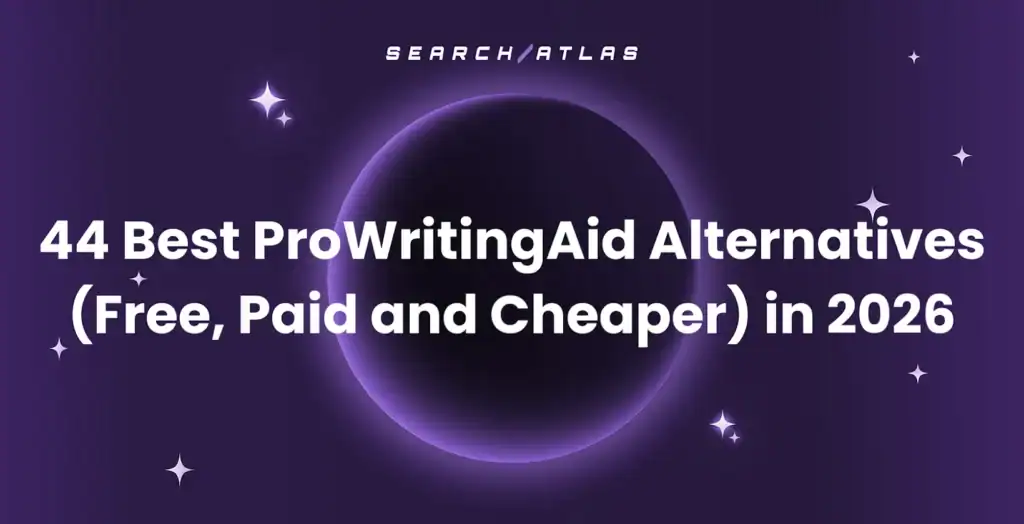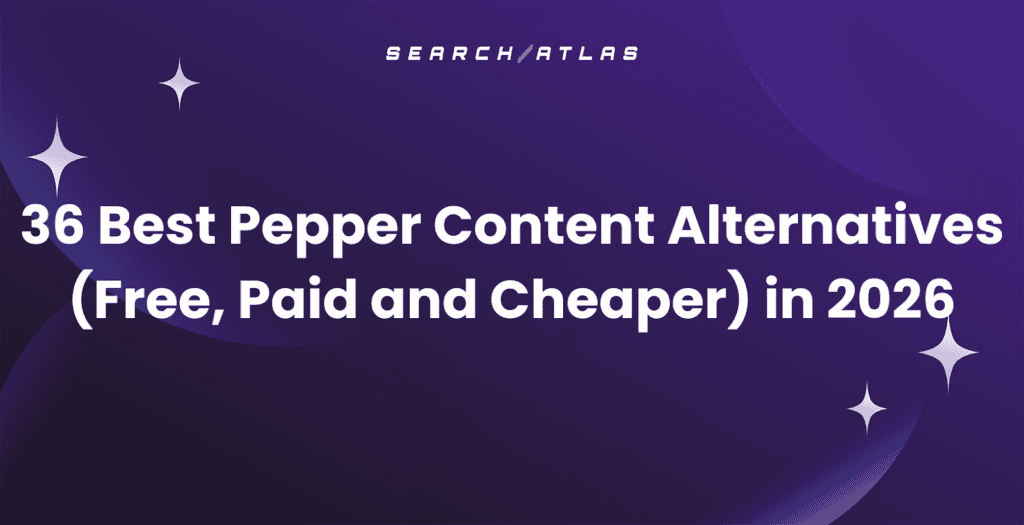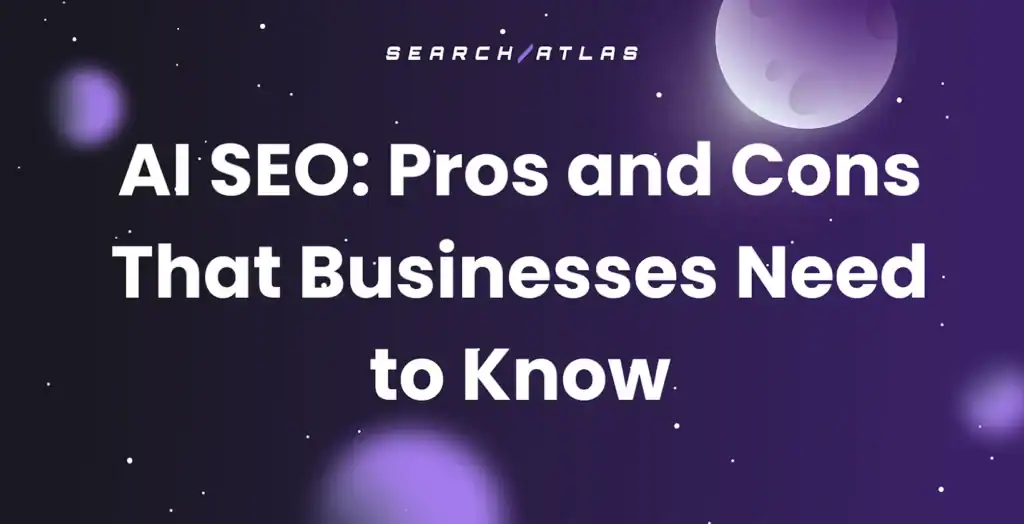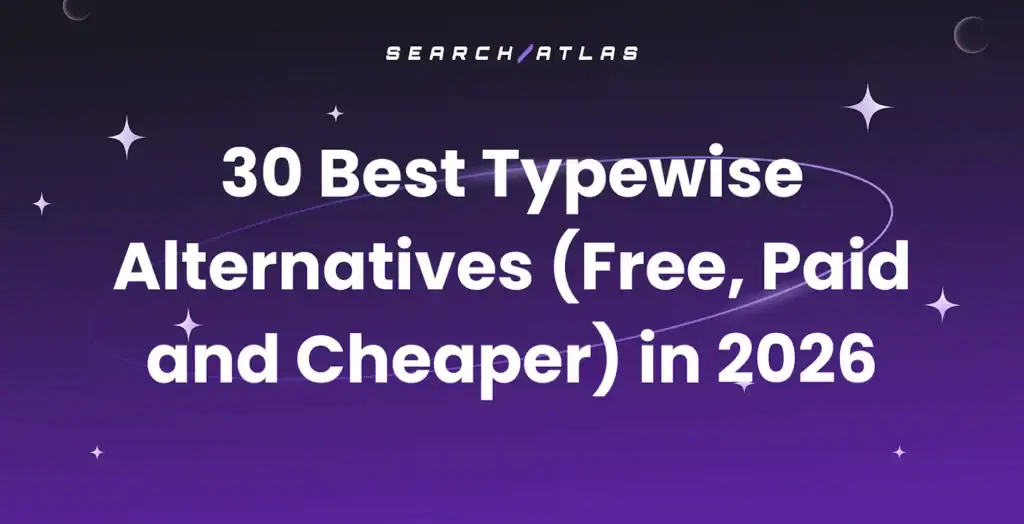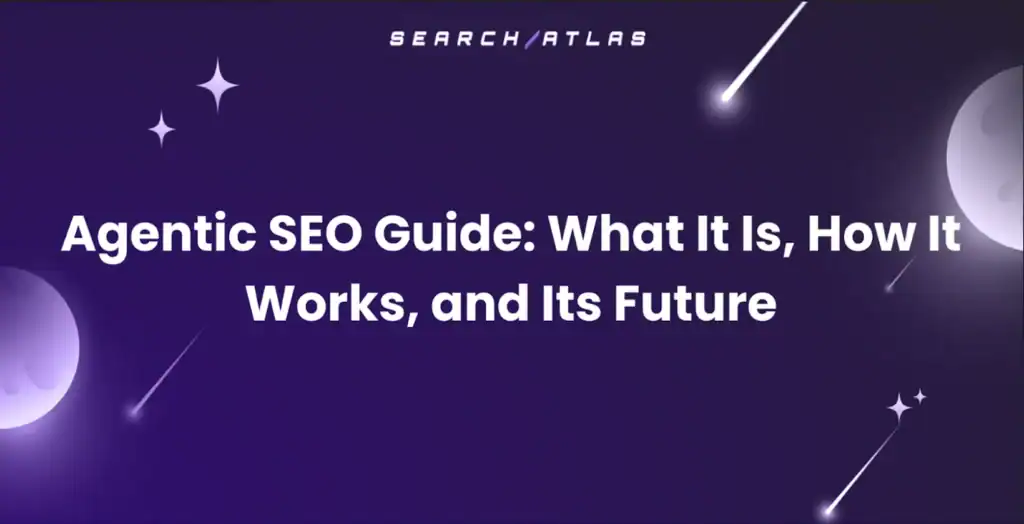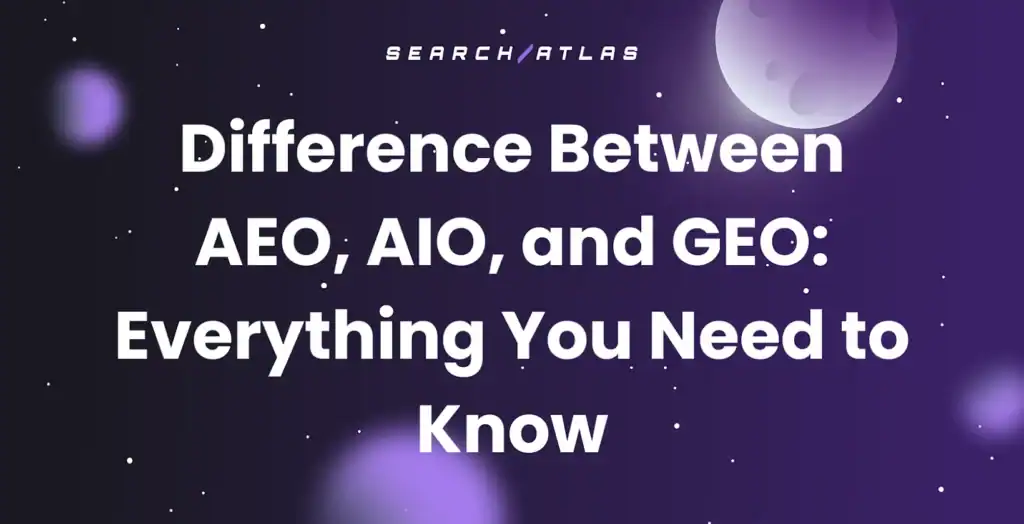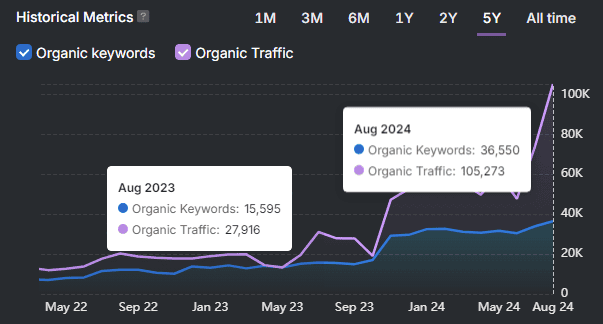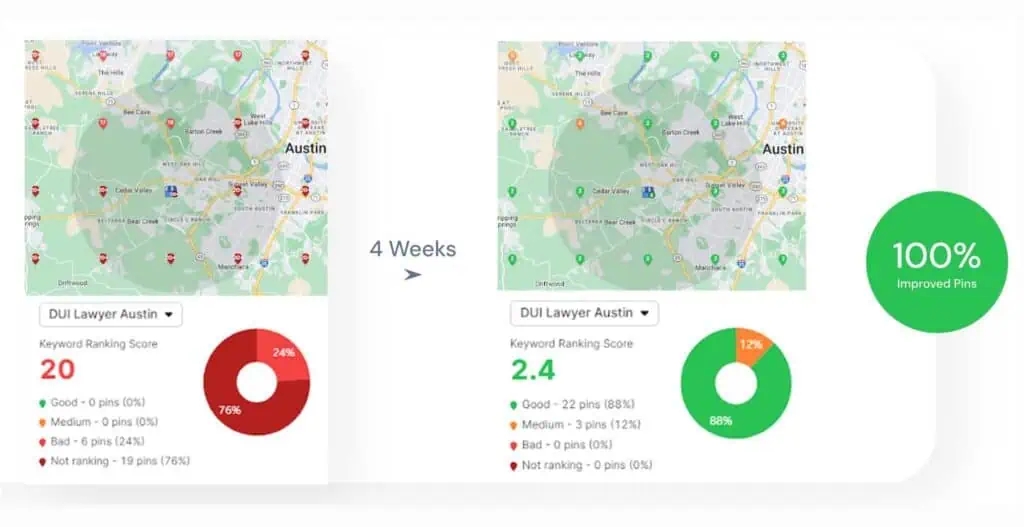Topical authority represents a website’s demonstrated expertise in a specific subject area. In the context of semantic SEO, topical authority reflects how well a website covers a topic. Topical authority rewards thorough, interconnected, and high-quality content. Topical authority SEO has become a core framework for ranking visibility, particularly in competitive niches.
When you build thorough coverage across an entire topic, search engines recognize your expertise and reward you with better visibility for a wide range of related queries. Many sites with high topical authority even outrank competitors with stronger domain metrics but less topic-specific depth.
From an SEO standpoint, building topical authority involves conducting entity-based keyword research, creating a topical map, developing a semantic content network, and optimizing internal linking and crawl budget. You can use tools like Google Search Console and the Search Atlas Topical Dominance Tool to measure topical authority and keyword clustering audits to assess content depth, query match rate, and search behavior.
What is Topical Authority?
Topical authority in SEO refers to a website’s perceived expertise and credibility on a specific subject, as determined by the depth, relevance, and semantic relationship of its content. Topical authority in SEO signals to search engines that the website is a reliable, go-to source for information within a defined topical area.
Authentic topical authority is built using semantic layers such as heading vectors, contextual anchors, dominant and sub-intents, and neural matching mechanisms. Topical authority transforms your website into a contextually rich source that fulfills all aspects of user search behavior within a subject area.
Topical authority methodology constructs the core of semantic SEO, where algorithmic authorship and predictive indexing determine whether your site becomes a primary reference for a topic cluster.
What is the History of Topical Authority?
The concept of Topical Authority originates from early Google patents that looked at website expertise through structured knowledge, semantic relevance, and query satisfaction. Although it was not explicitly labeled “topical authority” at the time, Google’s use of contextual vectors, entity recognition, and hierarchical classification of content across Knowledge Domains laid the foundational framework.
The semantic search ideas were embedded in patents such as “Website Representation Vectors”, “Generating Related Questions for Search Queries”, and “Contextual Estimation of Link Information Gain”, which influenced how Google evaluates content authority, surpassing keyword matching.
The first patent-confirmed implementations of these semantic technologies date back as early as 2005–2012, evolving through the introduction of the Knowledge Graph in 2012, Hummingbird in 2013, Medic update (relating to YLYM content) in 2018, and BERT in 2019. These algorithms are all aimed at understanding user intent and entity relationships.
But the methodology now referred to as “Topical Authority” wasn’t productized or taught as a replicable SEO system until May 18, 2022.
How Does Topical Authority Work?
Topical authority works through a website’s extensive coverage of a specific subject area. Search engines analyze how thoroughly a site addresses all aspects of a topic, rewarding those that demonstrate deep expertise with better rankings.
The SEO topical authority process relies on creating semantic connections between content pieces. When your website publishes multiple related articles on a subject, search engines recognize these relationships and view your site as a trusted resource. The more thoroughly you cover a topic and its subtopics, the stronger your authority signals become.
Topical authority focuses specifically on expertise in particular subject areas. A website might have strong topical authority in one area while having minimal authority in others, depending on its content focus.
What is the Importance of Topical Authority in SEO?
Topical authority is the cornerstone of modern SEO because it aligns perfectly with how semantic search engines evaluate expertise, trust, and relevance. Today’s search engines, especially Google, prioritize content creators who demonstrate broad knowledge across a topic cluster.
The shift from lexical to semantic understanding has revolutionized search engine optimization, as search engines now rely on topical graphs, contextual hierarchies, and entity relationships to determine which pages deserve to rank.
The most significant benefit of topical authority is its ability to help smaller websites compete with larger, more established domains. When a website demonstrates exceptional expertise in a specific niche, it can outrank larger competitors for related searches despite having fewer backlinks or lower domain authority. Topical authority provides a strategic SEO marketing advantage for businesses focusing on specific market segments instead of competing broadly.
Topical authority enhances user experience by creating a resource that addresses users’ needs at every stage of their journey. When visitors find answers to all their questions on your website, they spend more time engaging with your content and are more likely to return for future information needs. The improved engagement sends positive signals to search engines while building trust with your audience.
From a technical perspective, topical authority strengthens your site’s internal linking structure and content relationships, making it easier for search engines to understand your content’s context and relevance. As you build interconnected content pieces around a central topic, you create a semantic network that reinforces your expertise and improves crawling efficiency.
With strong topical authority, search engines begin testing and ranking your pages faster, assigning more favorable initial rankings, and often granting visibility across multiple query variations, even those you never explicitly targeted.
How to Build Topical Authority for SEO?
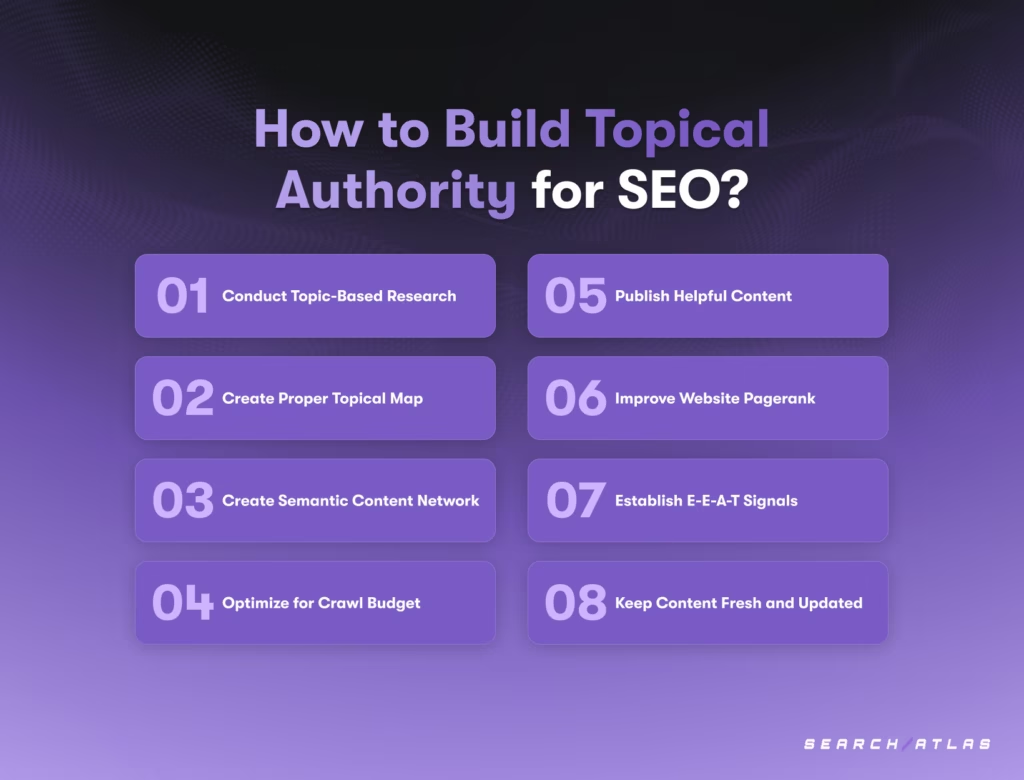
Building topical authority requires an intentional system of content engineering that positions your website as the most reliable, comprehensive, and contextually aligned source for a specific subject area. Unlike traditional SEO strategies that silo keywords, topical authority needs a holistic and semantic approach.
The 8 core steps to build topical authority are outlined below.
1. Conduct Topic-Based Keyword Research
Topic-based keyword research involves mapping the entire topography of your subject, identifying all related concepts, questions, and subtopics users search for.
You need to understand search intent and related search activities, do market research, and establish business identity and brand positioning to reveal the full scope of content required to build topical authority.
Start with broad seed keywords representing your main subject, then expand outward to discover related terms. The Search Atlas Keyword Magic Tool excels at revealing these semantic relationships, showing you keyword variations, questions, and related concepts. The Search Atlas Keyword Magic Tool helps identify content themes by analyzing how terms cluster around central topics.
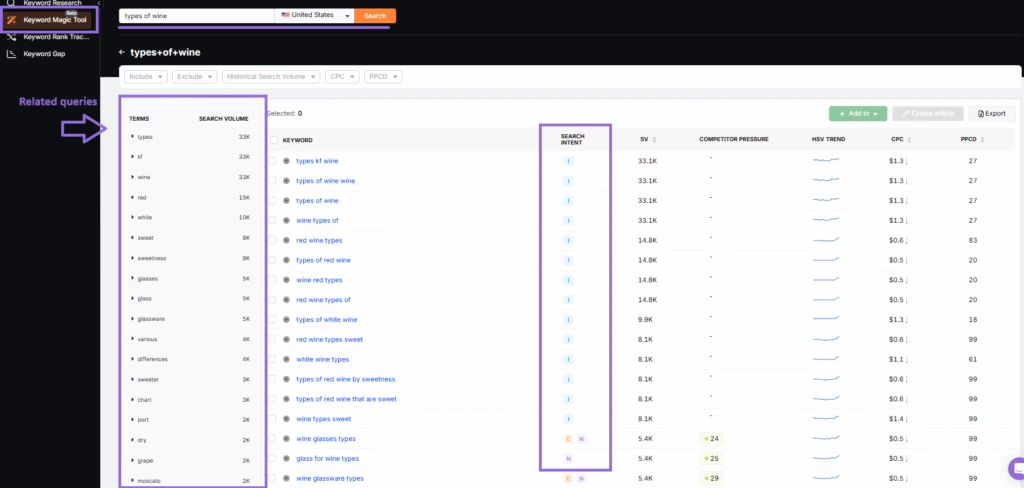
Group your keywords by search intent and topic relationship instead of just volume. Look for patterns in how users approach your subject – what questions they ask, what problems they need to solve, what comparisons they make. These patterns reveal the content types and structures your audience needs most.
Analyze competitor coverage with the Search Atlas Keyword Gap Tool to identify content gaps you can fill. The Search Atlas Keyword Gap Tool compares up to 6 websites and gives you an overview of Keyword Gap, Keywords in Common, Keyword Opportunities, Unique Keywords, and All Keywords.
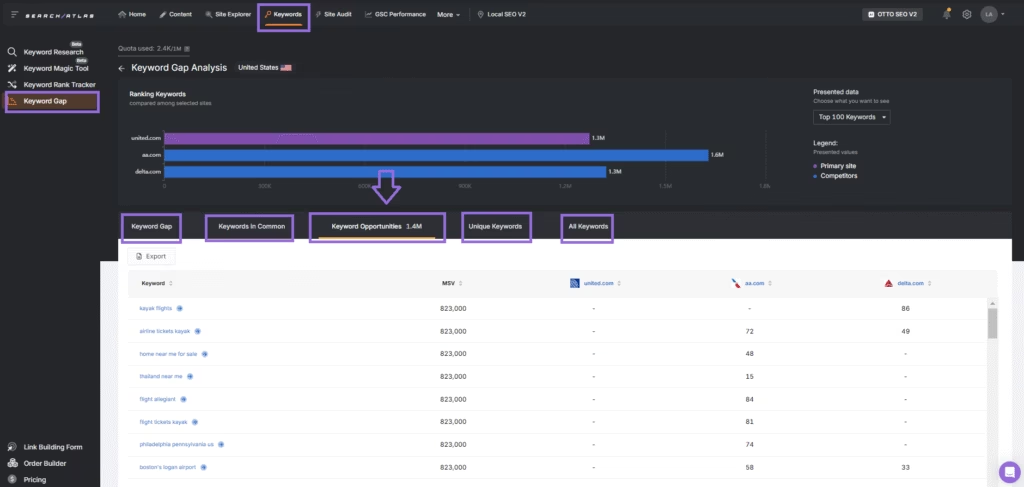
Look beyond high-volume terms to find unaddressed subtopics or unique perspectives within your niche. Often, these less competitive areas provide valuable opportunities to establish distinctive expertise while building your topical authority.
2. Create a Proper Topical Map
A topical map is a visual (or structural) representation of all relevant subtopics, entities, and content types related to a primary subject. A topical map defines your content hierarchy using contextual and conceptual layers. A proper topical map clarifies what topics to cover, in what order, and with what level of detail and interrelation.
To create a proper topical map, you will need to define topical map components and then, based on that, structure the topics as “topic clusters” for topical coverage with fewer pages.
The steps for creating a topical map are below.
- Identify parent topic > subtopics > supporting questions.
- Group content by search intent and funnel stage.
- Ensure each cluster page links horizontally (to siblings) and vertically (to parent/pillar content).
Understand how different aspects of your subject relate to each other and how users typically move between topics when exploring the subject. These relationships inform your internal linking strategy and content sequencing.
The Search Atlas Topical Map Generator Tool simplifies topical map planning by generating visual representations of topic clusters based on semantic connections. The Search Atlas Topical Map Generator Tool helps identify related subtopics, questions, and concepts to include in your content framework, guaranteeing that your topical map covers all relevant aspects of your subject.
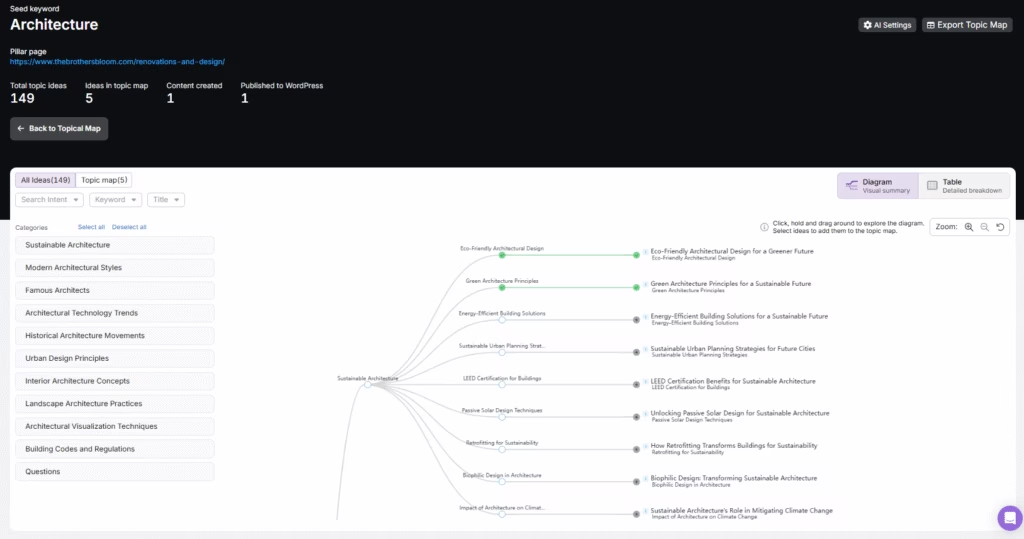
3. Create Semantic Content Network
A semantic content network is an interlinked group of pages that represent the full scope of a topical domain. Creating a semantic content network enables search engines to understand your expertise through topical connections, entity relationships, and intent-based linking.
Topical authority depends on interconnected content that flows through semantic anchors. Each page supports others through internal linking and content proximity, not random backlinks.
To create a semantic content network, follow the best practices below.
- Create templated content briefs that define keyword targets, content structure, FAQs, and internal link destinations.
- Make sure each page within a topic cluster references other related pages using semantically accurate anchor text (not just partial-match keywords).
- Build the network progressively, starting with pillar content, then supporting content, and finally intent-based edge pages.
- Use the Search Atlas Content Planner Tool to plan content around keyword clusters and ensure consistent structure, tone, and topical alignment across all your articles.
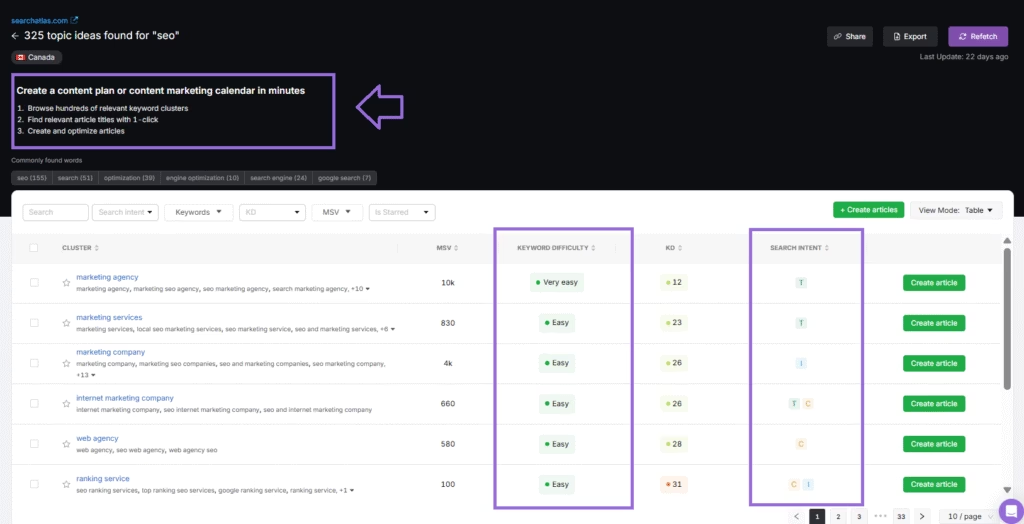
The Search Atlas Content Planner Tool helps you create a semantic content network by clustering high-opportunity keywords and aligning them with specific search intents. The Search Atlas Content Planner Tool provides topical breadth and depth, boosting user experience and search engine understanding, and lets you create articles directly within the tool.
4. Optimize for Crawl Budget
Optimizing for crawl budget helps search engines focus on indexing high-value content that aligns with user search behavior and not waste resources on outdated or low-impact pages. When your content strategy revolves around covering popular topics users are actively searching for, it naturally aligns with how crawlers prioritize and allocate crawl resources.
Crawl budget optimization ensures search engines can efficiently discover, crawl, and index your content. Crawl budget for SEO becomes increasingly important as your topical content grows, particularly for larger websites with extensive topic coverage.
The steps to optimize crawl budget are below.
- Cover popular search topics. Prioritize content with proven demand to ensure crawlers focus on indexing valuable, relevant pages.
- Prune low-quality pages. Use the Search Atlas Page Pruning Tool to remove thin, outdated, or duplicate content.
- Apply Noindex where needed, Block internal search pages, expired offers, and other non-essential URLs from being indexed.
- Use 301 Redirects. Consolidate link equity by redirecting outdated pages to relevant, active content.
- Simplify rendering. Defer non-critical JavaScript and keep core content visible in the initial HTML.
- Manage parameterized URLs. Block unimportant query strings in robots.txt to prevent crawl waste.
The Search Atlas Page Pruning Tool lets you consolidate or deindex low-quality and low-impression pages to free up crawl budget for meaningful content that builds authority.
5. Publish Helpful Content
Publishing helpful content is the basis of topical authority. Helpful content addresses user intent, resolves queries thoroughly, and adheres to Google’s quality signals like E-E-A-T (Experience, Expertise, Authoritativeness, and Trustworthiness) and NLP (Natural Language Processing) term density.
Google specifically rewards content that provides significant value to users compared to content created primarily for search engines or repeating what others have said.
The best practices for creating and publishing helpful content are listed below.
- Match the primary search intent. Make sure each page directly addresses the question or problem the user is trying to solve.
- Demonstrate topical expertise. Include detailed explanations, accurate terminology, and real-world examples or use cases to establish credibility.
- Take advantage of unique insights. Add first-hand experience, original research, or expert commentary to go beyond surface-level summaries.
- Format for user experience (UX). Use headings, bullet lists, and visual cues to make your content easier to scan and absorb.
- Avoid over-optimization. Stay natural in tone and avoid keyword stuffing. Focus on semantic relevance instead of repetition.
You can use the Search Atlas Content Genius Tool to write, optimize, and evaluate your article. The Search Atlas Content Genius Tool analyzes competitor content, maps semantic coverage, and scores your draft based on Google’s NLP signals and topical completeness.
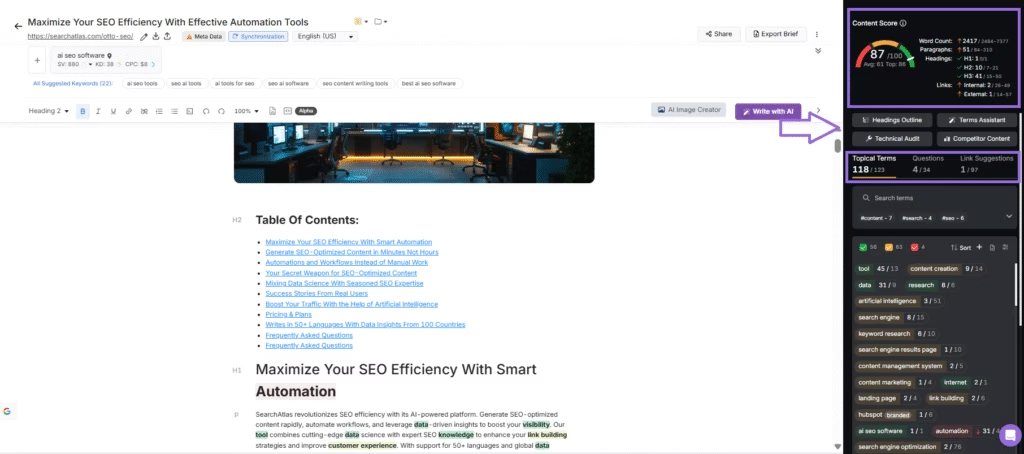
Use the Search Atlas Content Genius Tool’s suggestions of topical terms, questions, and possible internal links to make your content helpful with just a few clicks.
Additionally, the Search Atlas Scholar Tool provides content clarity and readability checks, information gain assessment, user intent, and factuality alignment. Search Atlas Scholar Tool gives you actionable insights to improve clarity and originality, the core drivers of algorithmic trust.
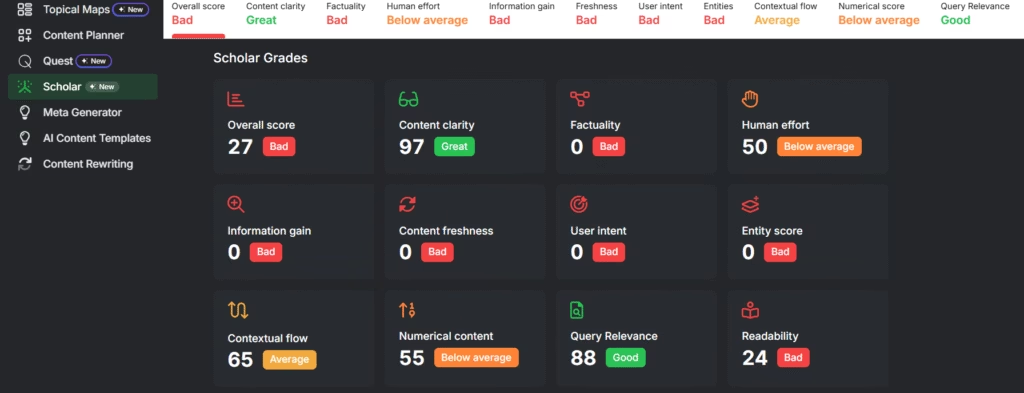
6. Improve Website PageRank
Improving website PageRank means strategically strengthening the flow of link equity across your site and not leaking it unnecessarily. Although it is hidden now, PageRank remains a foundational ranking signal of Google’s algorithm, acting as the currency of trust passed through hyperlinks.
The top three practices to increase PageRank are outlined below.
- Build high-quality backlinks internally and externally. Focus on acquiring backlinks from topically relevant, authoritative domains. These links pass PageRank to your pages and reinforce semantic signals when anchor text is keyword-aligned.
- Avoid excessive external linking. Linking to external sources without rel=”nofollow” can dilute your PageRank. Each outbound link splits your link equity, so use them only when they add significant user value or contextual relevance.
- Use internal links to retain and redistribute PageRank. Internal linking is your most controllable method of redistributing PageRank to priority URLs. Use a hub-and-spoke structure to flow equity from high-authority pages (like backlinks-rich articles) to supporting or conversion-focused content.
By managing how PageRank flows (and where it leaks), you control one of the strongest legacy ranking signals Google still uses.
7. Establish E-E-A-T Signals
E-E-A-T (Experience, Expertise, Authoritativeness, and Trustworthiness) signals help search engines evaluate your content quality and reliability. E-E-A-T is especially important if you’re in YMYL (Your Money or Your Life) niches, i.e., writing about topics that can impact users’ health, finances, or safety.
The main factors for establishing E-E-A-T signals are below.
- Authorship transparency. Include detailed author bios that showcase real-world credentials, past publications, and domain-specific experience. Link to social profiles or third-party credentials to support the identity and topical expertise of the writer.
- Publication date freshness. Prominently display the publication date and use structured data to mark updated content. Frequent updates signal topical commitment and editorial integrity.
- Editorial and review process. Describe how content is fact-checked, reviewed by subject matter experts, or updated in response to regulatory or scientific developments. This is especially important for YMYL topics.
Strong Google E-E-A-T signals reinforce your topical authority by demonstrating that your content is created by qualified experts and backed by reliable information.
8. Keep Content Fresh and Updated
Keeping content fresh and updated guarantees it remains accurate, relevant, and valuable to users over time. Topical authority isn’t static, as the historical data component confirms. It decays if it’s not maintained. As user behavior and semantic associations shift, there is a semantic distance and relevance change, so once relevant content may become obsolete or contextually distant.
To keep your content fresh, follow the best practices below.
- Establish a content audit schedule to identify outdated information.
- Update statistics, examples, and references with current data.
- Expand content to address emerging subtopics and questions.
- Refresh outdated formatting or presentation for a better user experience.
- Republish significantly updated content to signal freshness to search engines.
Regular updates demonstrate your ongoing commitment to the topic and ensure your content remains valuable as the subject evolves.
What Businesses Need Topical Authority the Most?
While topical authority benefits virtually all online businesses, some industries and business types gain particular advantage from this SEO methodology.
The types of businesses that need topical authority the most are listed below.
- Tourism Businesses. Travel and tourism companies benefit significantly from topical authority because travelers research in-depth before making decisions. A destination-focused website that covers local attractions, accommodations, transportation, and seasonal considerations establishes trust with potential visitors. This wide coverage captures travelers throughout their research journey, from initial inspiration to specific planning questions.
- SaaS Businesses. SaaS (Software-as-a-Service) companies often operate in specialized niches with technical concepts that require explanation. Building topical authority allows SaaS businesses to educate potential customers about industry challenges and solutions, positioning their product as the logical answer to these needs. The educational perspective supports longer sales cycles common in B2B software purchases.
- E-commerce Businesses. E-commerce businesses or online retailers dealing with specific product categories can use topical authority to stand out in cut-throat markets. By providing detailed information about product types, usage guides, comparison content, and solution-based approaches, e-commerce businesses can capture customers throughout the buying journey instead of just at the point of purchase.
- Healthcare Providers. Medical practices and healthcare organizations must establish exceptional trustworthiness. Building topical authority through comprehensive, accurate health information demonstrates expertise while helping patients make informed decisions. This approach is particularly valuable given Google’s emphasis on E-E-A-T for health-related content.
- Educational Institutions. Schools, universities, and online learning platforms naturally benefit from topical authority in their areas of instruction. By creating detailed resources around their educational offerings, educational institutions attract potential students researching their educational options while demonstrating subject matter expertise.
Businesses in these sectors should prioritize topical authority as a core SEO strategy, as it directly aligns with their audience’s information-seeking behaviors and decision-making processes.
How to Measure Topical Authority?
Topical authority can’t be measured through a single score, but it can be evaluated by analyzing a combination of content quality, topical coverage, internal linking, and user engagement over time.
To determine the topical authority of a piece of content, evaluate the factors listed below.
- Topical Coverage. Has the content fully addressed subtopics, related questions, and semantic entities relevant to the main topic?
- Internal Relevance. Is the content properly integrated within your site’s topic cluster or semantic content network?
- Engagement Signals. Does the content drive time on page, low bounce rates, or user interactions?
- Link Velocity. Is the content attracting internal and external links from other authoritative, related content?
- SERP Positioning & Stability. Has the content earned and sustained a top position for multiple variations of the target query?
What Tools Track Topical Authority?
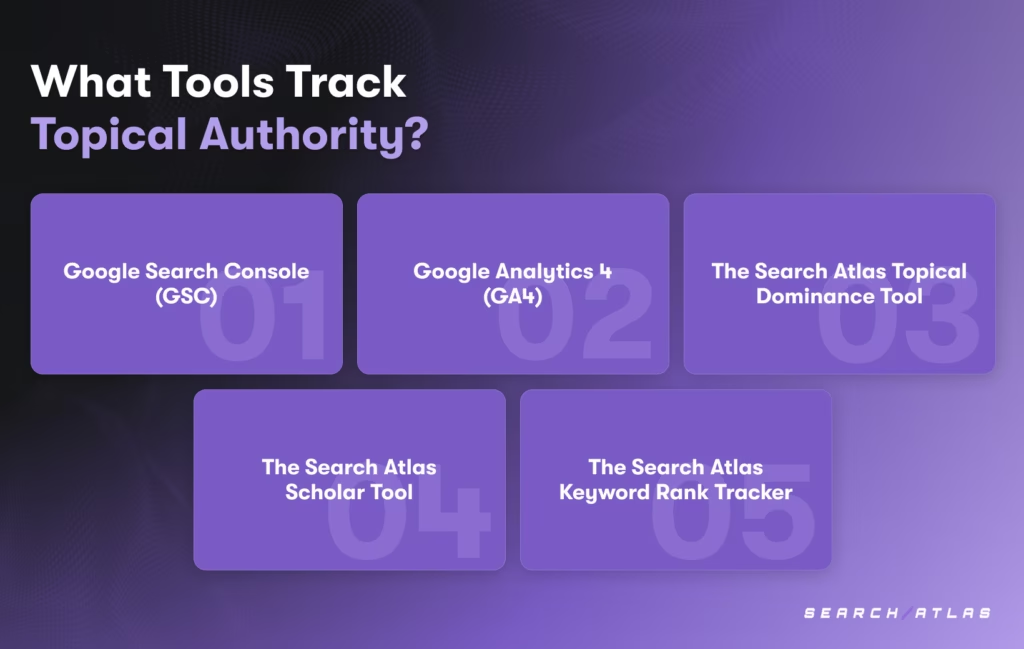
Tools that track topical authority measure how comprehensively your content covers a subject, how it performs semantically across SERPs, and how it aligns with Google’s ranking signals. The best tools for tracking topical authority combine SERP data, entity recognition, internal link analysis, and historical performance insights.
Topical authority tracking solutions include Google-native data sources and advanced SEO platforms that leverage AI, NLP, and content graph technology. The best tools for evaluating and monitoring topical authority are listed below.
- Google Search Console (GSC) offers foundational insights into topical performance by tracking impressions, clicks, and average position across keywords tied to a given page or cluster. As a free tool, it helps identify which topics Google associates with your content and which semantic gaps exist. URL Inspection, Page Experience, and Coverage reports highlight indexing or crawling issues that may hinder topic visibility.
- Google Analytics 4 (GA4) helps measure how users engage with your topical content. Time on page, scroll depth, engagement rate, and returning visitor behavior all reflect the perceived quality and relevance of your topical coverage. While GA4 doesn’t assign a “topical authority score,” it reveals behavioral signals that influence how Google interprets authority.
- The Search Atlas Topical Dominance Tool provides a domain-wide heatmap of topic coverage. The Search Atlas Topical Dominance Tool analyzes your site versus competitors across specific, broad, and knowledge-level topics. Scores like Topical Dominance, Semantic Distance, and Topic Coverage measure your completeness in each topical area.
- The Search Atlas Scholar Tool evaluates your content’s semantic strength based on Google’s Page Quality guidelines and information retrieval models. The Search Atlas Scholar Tool scores content on clarity, factuality, topical depth, and information gain, all of which are critical to earning and sustaining topical authority in competitive SERPs.
- The Search Atlas Keyword Rank Tracker monitors keyword position across clusters, helping assess how well your topical authority converts into rankings. The Search Atlas Keyword Rank Tracker supports daily tracking, SERP feature alerts, and movement analysis across grouped entities, allowing you to isolate authority gains or losses by topic.
Together, Google’s free tools and specialized Search Atlas premium SEO tools provide a framework for building, evaluating, and improving topical authority across your domain.
How to Learn Topical Authority?
To learn topical authority, you need to start by understanding how search engines function at a foundational level. Study the anatomy of search, specifically information retrieval, semantic search, and entity-oriented indexing. The concepts explain how search engines parse content, identify topic coverage, and rank entities across knowledge domains.
Free resources include Google’s research publications, patents, and SEO blog breakdowns. To truly understand how Google evaluates topical relevance and authority, read through patents like Generating Related Questions for Search Queries, Contextual Estimation of Link Information Gain and Website Representation Vectors. Explore academic papers on entity-based retrieval and semantic query rewriting. Many are publicly available through resources like arXiv.org or Google Scholar.
Search Atlas is a leading SEO software platform in the semantic SEO space. The Search Atlas universe offers educational resources, including topical mapping tutorials, content coverage audits, and entity-based optimization walkthroughs. The platform includes proprietary tools like the Search Atlas Topical Dominance Tool and OTTO SEO, which help visualize and measure topic depth, semantic relationships, and content saturation.
Apply what you’ve learned by creating your own topical maps, which can be trial structured hierarchies of interrelated content that address all layers of user intent. Use free tools like Google Search Console, Google Trends, or Google’s NLP API with paid tools like Search Atlas to map entities, analyze topical gaps, and structure clusters.
Are There Any Authority Website Examples?
Yes, there are several websites that demonstrate strong authority through structured content, consistent updates, and semantic depth. Examples of authority websites across various industries are below.
- Healthline. Healthline is a prominent health information website with medically reviewed content on health topics. Healthline is known for its exhaustive articles, expert insights, and adherence to high editorial standards, making it a trusted source for health-related information.
- Investopedia. Investopedia offers extensive financial education content, including definitions, articles, and tutorials on investing, finance, and economic topics. Its in-depth explanations and up-to-date information have established it as a leading authority in the financial sector.
- WebMD. WebMD provides valuable health information, tools for managing health, and support for those seeking medical advice. Its content is reviewed by medical professionals, ensuring reliability and trustworthiness in the health information domain.
- LinkGraph. LinkGraph demonstrates SEO topical authority through educational resources, technical documentation, and content structured around semantic SEO best practices.
- The Spruce. The Spruce excels in the home improvement and lifestyle category, with semantically grouped DIY, gardening, and interior content structured into pillar-hub formats.
What is the Relation Between Topical Authority and Holistic SEO?
Topical authority and holistic SEO connect through their shared emphasis on content coverage, semantic relationships, and entity-based optimization. Topical authority represents a website’s depth of expertise in specific subject areas, while holistic SEO provides the framework for implementing this expertise across all optimization areas of technical structure, user experience, content quality, and authority signals.
Search Atlas XACT (UX, Authority, Content, Technicals) Holistic SEO Framework shows how the concepts of topical authority and holistic SEO integrate. Strong topical authority powers your content strategy, while holistic SEO implementation provides that this expertise is delivered to users and recognized by search engines. This creates a stronger overall search presence than either approach could achieve alone, as your site demonstrates both depth of knowledge and excellence in delivery across all aspects of the search experience.
What to Know About Topical Authority Besides Semantic SEO?
Topical authority reflects a website’s proven ability to cover a subject, while semantic SEO is the method used to structure and optimize that content based on meaning, entities, and user intent.
The relationship between topical authority and semantic SEO is symbiotic. Semantic SEO provides the framework (entity connections, contextual layering, and internal linking) that enables topical authority establishment over time. Without semantic optimization, content cannot effectively signal depth, relevance, or coverage, which are required to earn algorithmic trust. Therefore, building topical authority demands the application of semantic SEO techniques to interpret, link, and reinforce the knowledge graph around a topic. Mastering semantic SEO is a prerequisite for sustainably gaining and measuring topical authority.
What is the Difference Between Topical Authority and Topical Map?
Topical authority and topical maps serve different but complementary functions in your SEO strategy. Topical authority is the outcome. Achieving topical authority means your site becomes the go-to source for that topic based on historical performance, internal linking, user engagement, and content depth. A topical map, on the other hand, is the strategic blueprint that helps you achieve topical authority.
A topical map is a visual or tabular representation of the content clusters, supporting articles, and entity relationships needed to cover a topic comprehensively. A well-structured topical map outlines all the semantic relationships between subtopics, aligning your content production with user intent and search engine expectations.
What is the Difference Between Topical Authority and Topical Relevance?
Topical authority and topical relevance work together but are not interchangeable. Google’s neural matching systems analyze topical relevance at the query-document level, dynamically interpreting context, entities, and intent. How to build topical relevance can shift based on temporal trends, language evolution, or changing user behavior.
Topical authority reflects whether your entire domain consistently demonstrates expertise and coverage across a thematic space. Topical relevance determines if a single page is the best match for a specific query at a given time.
If a site only optimizes for short-term relevance without building topical authority, it risks rank decay when relevance patterns shift. For example, a page on “remote work productivity” written during the 2020 pandemic might lose relevance in 2025 if not updated or contextualized within a broader productivity topic cluster.
What is the Difference Between Topical Authority and Domain Authority?
Topical authority and domain authority are both measures of a website’s influence, but they operate differently. Topical authority is topic-specific trust, based on semantic content depth, entity coverage, and behavioral performance over time within a focused subject.
While domain authority (DA) is a general score based on link quantity and quality across the entire domain, it doesn’t account for semantic depth or content quality within specific topics. A site can have a high domain authority and still lack topical authority in a given subject.
In practice, topical authority drives Google rankings more directly than domain authority because search engines favor sites that demonstrate focused expertise, not just link power. For example, a website with strong topical authority in “technical SEO” may outrank a high-DA site that only briefly touches the topic.


